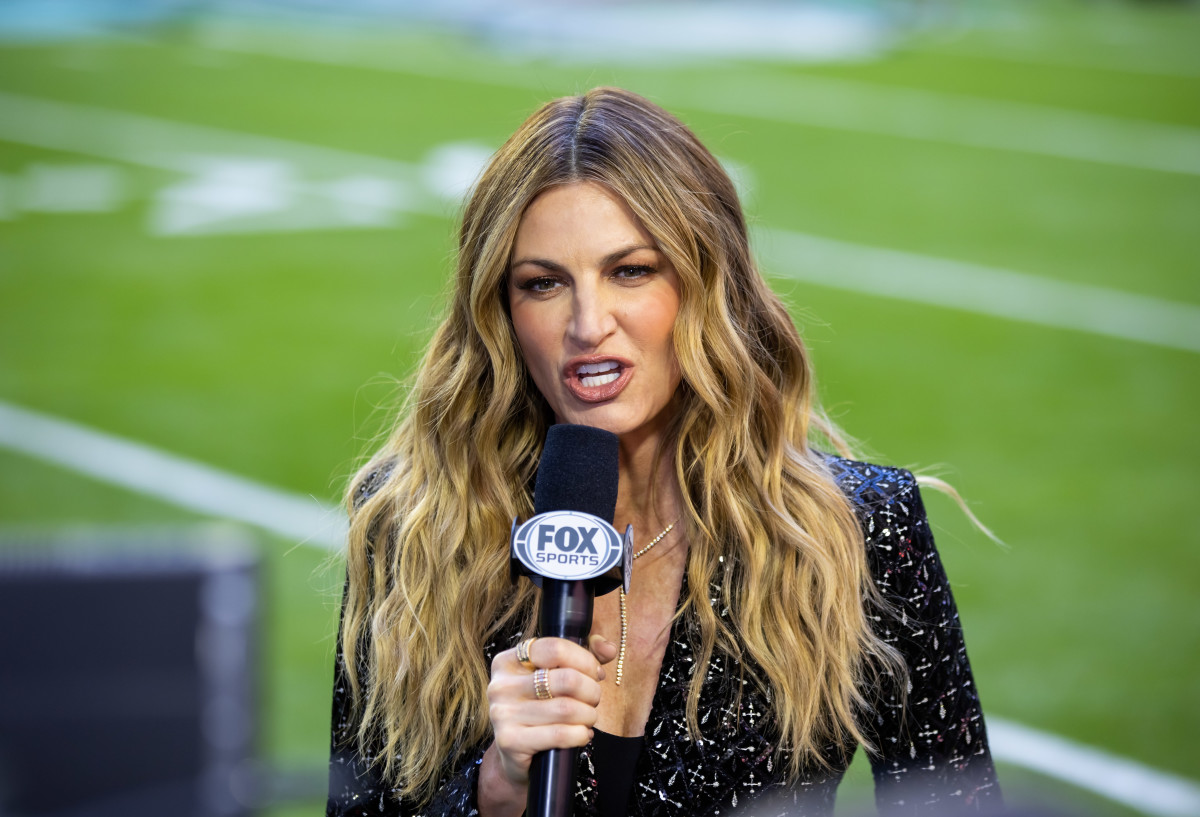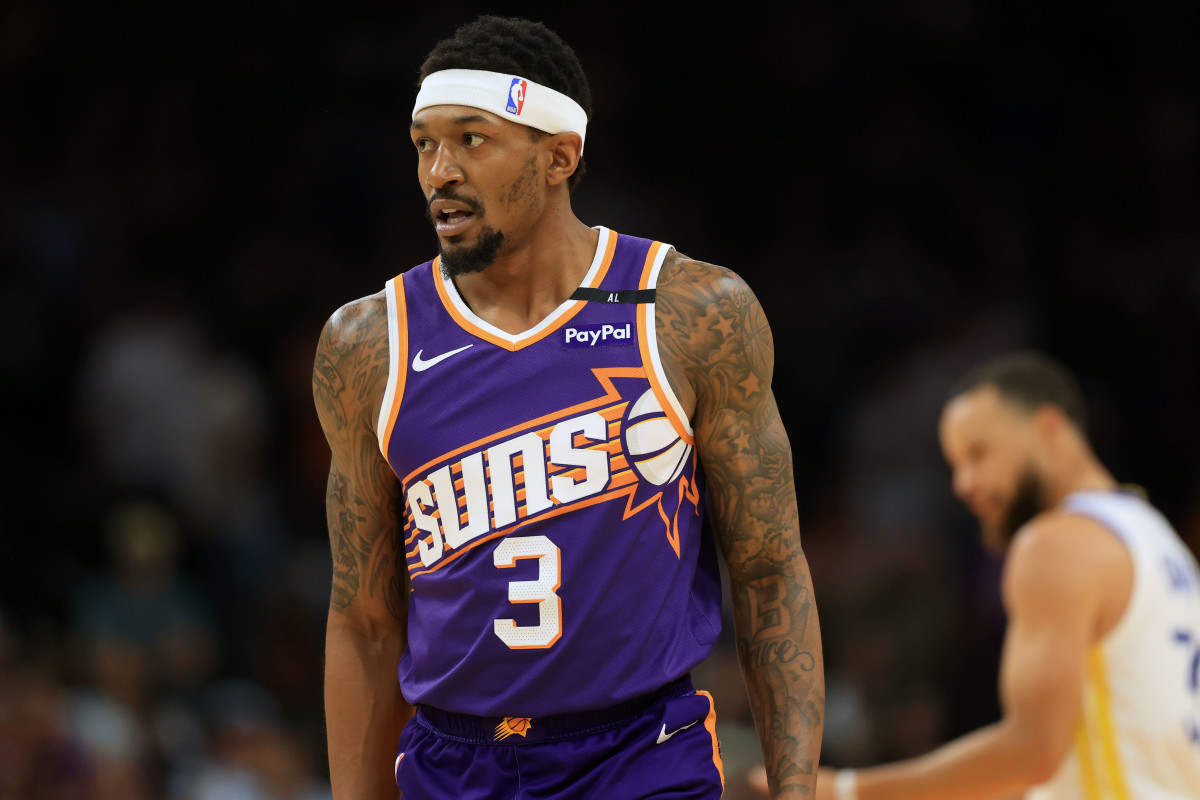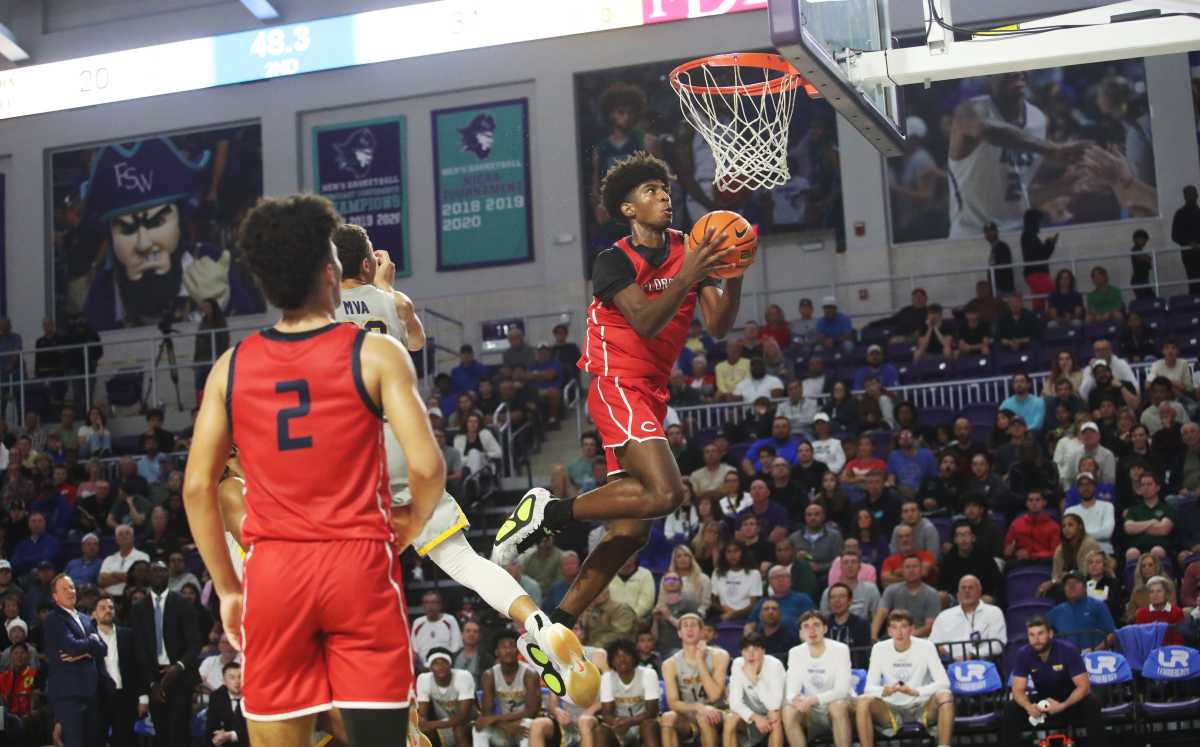FRISCO, Texas — Within a small booth three stories above the practice field of the Dallas Cowboys, Kenny Dillingham crosses his legs, leans back in a swivel chair and details exactly what’s happening across the current college football recruiting landscape.
“We don’t know the rules,” the Arizona State coach says. “The settlement passed, but who knows what Deloitte is going to clear. Until there is clarity, you’re living in limbo.”
Advertisement
And there’s something else, too.
“You are seeing a lot of people lie and promise fake things,” he says.
The Big 12 on Tuesday kicked off three weeks of conference football media days from the Cowboys' domed practice facility just north of Dallas, its head coaches, administrators and players jaunting across the turfed field to various media stations on Day 1 of a two-day event. It unfolded in front of a backdrop of what happened a week ago: the implementation of the NCAA’s historic settlement of an antitrust case — a move that has ushered in direct athlete-revenue sharing.
A similar theme emerged from the eight head coaches here Tuesday, one likely shared by the eight others who get their turn on Wednesday: The Wild West, they say, remains wild for now.
Advertisement
The finger pointing has already begun.
Schools are making big enough contract offers to recruits that they cannot possibly remain under college football’s new compensation cap, some coaches believe. Others are guaranteeing third-party NIL deals as part of the total compensation package to athletes — something against new revenue-share rules.
A few are doling out cash from their collectives to high school players in an attempt to induce their commitment — also against new rules. And those schools rich enough to have front-loaded millions of dollars in the spring to compensate this year’s roster — while perfectly within the rules — now hold an advantage in building next year’s roster.
“I don’t understand what rules everybody is playing by,” Cincinnati coach Scott Satterfield says. “The whole point of this was for us all to be playing by the same rules, but we are not. We are not playing by the same rules, particularly this past spring when everybody is apparently frontloading where others are having to now spend their (revenue-share) cap.”
The Big 12 and its coaches aren't alone in complaining about the new system after the House settlement. (Kevin Abele/Getty Images)
(Icon Sportswire via Getty Images)
Meanwhile, the newly minted entities charged with enforcing these policies, the College Sports Commission and its Deloitte-run NIL clearinghouse, are bogged down in legalities tethered to the settlement, those familiar with the process tell Yahoo Sports.
Advertisement
In fact, dozens and potentially hundreds of submitted third-party NIL deals — some, perhaps, from booster collectives — remain under review as college leaders negotiate with House plaintiff lawyers over a final set of cap-circumvention rules and penalties. Plaintiff lawyers, most notably co-lead attorneys Jeffrey Kessler and Steve Berman, hold authority and approval rights to a variety of settlement enforcement concepts, including rules and penalties that, in the end, are likely to determine final decisions from the College Sports Commission.
These rules identity a variety of possible ways schools may attempt to circumvent the cap, including the guaranteeing of third-party NIL compensation in offers to athletes, NIL contracts struck with those in high school and particulars around the NIL clearinghouse’s primary enforcement mechanisms for booster-backed contracts — that they are required to be within a “fair market-compensation range” created by Deloitte and must be for a “valid business purpose.”
Contacted this week, Kessler told Yahoo Sports that attorneys are working with major conference administrators to finalize the approval of what some term as “anti-circumvention” or “gamesmanship” rules.
In the meantime, certain submitted NIL deals remain in limbo. That doesn’t go for all of them.
Advertisement
Of the more than 1,200 deals submitted to the clearinghouse so far, about one-third have been approved — many of them with little to no issue, those with knowledge tell Yahoo Sports. About 80 have been denied and are likely, if they haven’t already, to be resubmitted (deals can be resubmitted once).
Kessler says that no deals have advanced past the second denial stage and into the appeals phase, where athletes present their case before a neutral arbitrator. College executives and attorneys are finalizing a group of eight arbitrators — many of them former judges, Kessler says — to serve as an independent arbitration group.
As college administrators and attorneys embroil themselves in legal negotiations, football coaches and general managers are preparing for the first-ever Aug. 1 official NCAA “offer date,” when schools can formally offer revenue-share contracts to prospects (some have already, informally).
On the recruiting trail across the country, Big 12 coaches say they are witnessing schools finding new ways, in the revenue-share era, to circumvent the cap and skirt the rules — perhaps even in their own league.
Advertisement
“I’ve seen these agents coming out and saying, ‘It’s a guaranteed three-year deal for a high school kid.’ One in our league right now,” Satterfield said. “How?”
Said UCF coach Scott Frost: “Only comment I have is about some of the offers going out to freshmen. Those people must not be planning on there being a cap because they wouldn’t be able to spend that.”
In what’s been no real secret, Texas Tech has used riches to fuel what’s become a recruiting juggernaut. The athletic program has spent more than $50 million on their athletes in both front-loaded money this past spring plus revenue-share dollars this coming academic year. That’s at least the frontloading of $30 million plus $20.5 million in rev-share.
Frontloading refers to the literal loading upfront of player contracts as school collectives paid out all or a majority of deals before the settlement’s implementation date of July 1. Deals paid out on July 1 and after are subject to the new enforcement system specifically created to prohibit booster and collective compensation.
Advertisement
Joey McGuire, the Texas Tech coach, describes his recruiting approach as the byproduct of high-level university support, careful planning and an “aggression” that all schools should be taking to compete with the bluebloods of college football.
“What we do as a conference is so important, but we also got to do it off the field,” he told Yahoo Sports in an interview. “We’ve got to recruit at this level if we are going to continue to be in the same conversation as the SEC and Big Ten. We’ve got to understand as a conference that we’ve got to commit to that. We have committed to that at Texas Tech and eliminated any people saying ‘Well, they can’t do it there.’”
They are far from alone in frontloading. Booster collective spending on athletes in June was more than 800% higher than last June, according to Opendorse, an NIL platform used by dozens of collectives. According to another NIL platform, Teamworks, collectives distributed a whopping $71 million to athletes in June using their system.
“When you frontload, that gives you the ability to have money in the rev-share this year to make big-time payments and close out guys,” says Baylor coach Dave Aranda. “That’s what I’m seeing right now. There’s a fair amount in our league that did it. There are a couple of schools here today.”
Advertisement
But there is a downside, Dillingham says.
“Most places are so win now and most coaches aren’t at a place they want to stay at,” he said, “Either you’re at the top, and it’s win now or as long as you can. Or you’re at a place where it’s win now and you can leave and get out. The frontloading allowed coaches to win now to take another job.
“But at the end of the day, all these people who frontloaded, eventually, you’re gonna have to tell players they have to take less. You may have set a standard for what people should be paid. Your starters may expect a certain amount of money when in reality they cannot functionally earn that amount of money if you want to build a team.”
All of that, of course, is contingent on the College Sports Commission and Deloitte-operated NIL clearinghouse policing deals strictly enough.
Advertisement
“I don’t know how Deloitte is going to act,” Dillingham said, “but I know there are some future challenges where people don’t get the money that they were told they’d get.”
Kansas State coach Chris Klieman didn’t have the luxury to frontload, he said.
“There are schools [that will] have $50 million rosters," Klieman said. "You can’t be mad about it because it was legal, but that’s why this first year will be interesting once we end the season. What will happen moving forward? That’s where it’s going to get really interesting. That’s what we are concerned about: How do we reel this in? Is Deloitte going to really stay on top of that?”
Big 12 commissioner Brett Yormark, one of the people intimately involved in decisions around the new enforcement entity, holds confidence that the system will work.
Advertisement
“In theory, the settlement should create a more level playing field and enforcement will effectively determine if that’s the case or not,” he told Yahoo Sports. “I think the onus is on the commissioners to reinforce that there needs to be a change in behavior.”
Already, there are cap-circumvention issues emerging in contracts and promises made to athletes.
For instance, at SEC spring meetings in May, Georgia coach Kirby Smart told Yahoo Sports that schools are promising high school recruits and transferring players third-party NIL deals as part of their compensation package despite an important fact: None of those deals have been approved by the clearinghouse.
Advertisement
Some school-affiliated booster collectives are currently compensating high school players — upwards of $20,000 a month — to remain committed and eventually sign with their school, Smart and other coaches say.
Dillingham said he’s seen contracts that also permit schools to end or reduce a player’s salary over the course of the deal, something reported earlier this spring by Yahoo Sports via Illinois law professor Michael Leroy, who uncovered more than 90 different player contracts through open-records requests.
“These NIL contracts read like employee handbooks that reserve a right of employment at will for employers,” he said. “They don’t use ‘at will’ but the concept is, they can terminate the contract.”
In one ACC revenue-share contract obtained by Yahoo Sports, the school includes in the total compensation to the player a figure for “NIL” of $25,000 annually. Next to that figure is a line: “Subject to the Deloitte Clearinghouse.”
Advertisement
“You don’t know if your NIL collective deals will go through and the school can change your rev-share dollar amount at any time,” Dillingham said. “Well, then what are we actually doing?!”
Many coaches are asking that question and plenty more.
Asked Tuesday if he’s heard feedback from the NIL clearinghouse, Scott Frost smiled: “No. Have you?”
.png)
 German (DE)
German (DE)  English (US)
English (US)  Spanish (ES)
Spanish (ES)  French (FR)
French (FR)  Hindi (IN)
Hindi (IN)  Italian (IT)
Italian (IT)  Russian (RU)
Russian (RU) 







Comments